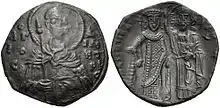Manuel Doukas
Manuel Komnenos Doukas, Latinized as Ducas (Greek: Μανουήλ Κομνηνός Δούκας, Manouēl Komnēnos Doukas; c. 1187 – c. 1241), commonly simply Manuel Doukas (Μανουήλ Δούκας) and rarely also called Manuel Angelos (Μανουήλ Ἄγγελος),[1] was ruler of Thessalonica from 1230 to 1237 and, after his expulsion from Thessalonica, of Thessaly from 1239 until his death in c. 1241.
Manuel Doukas | |
|---|---|
| despotes | |
 | |
| Born | c. 1187 |
| Died | c. 1241 |
| Noble family | Komnenodoukai |
| Spouse | Jefimija Nemanjić (1st) Maria Asen (2nd) |
| Issue
Helena | |
| Father | John Doukas |
Life
Manuel was a legitimate son of the sebastokratōr John Doukas. He was thus a first cousin of the emperors Isaac II Angelos and Alexios III Angelos, and a brother of Michael I Komnenos Doukas and Theodore Komnenos Doukas of Epirus.
He married the sister of Serbian Grand Prince Stefan Nemanjić (r. 1196–1228).
Career
Probably after 1225 or 1227 he was given the court dignity of despotes by his brother, Theodore. In 1225, he married Maria Asen, the illegitimate daughter of Ivan Asen II of Bulgaria, helping to cement his brother's alliance with this country.
After his brother's defeat and capture by the Bulgarians at the Battle of Klokotnitsa in 1230, Manuel was allowed by Ivan Asen II to rule in Thessalonica and its environs with the title of despotes. At one point Manuel tried to establish contacts with the Papacy, but in 1232 the longstanding breach with the Eastern Patriarchate at Nicaea was finally healed.
Manuel ruled peacefully until 1237, when his widowed father-in-law Ivan Asen II married Irene, the daughter of the captive Theodore. At this point Theodore and his sons were released from captivity and resolved to recover the rule of Thessalonica. Manuel was unsuccessful in seeking the support of Prince Geoffrey II Villehardouin of Achaea and was forced to flee to Asia Minor.
After a spell among the Seljuks of Rum and in Nicaea, Manuel returned to Greece with Nicaean support in 1239 and captured several fortresses including Larissa and Pharsalos from Theodore's son John Komnenos Doukas, establishing himself as ruler of Thessaly. Theodore and John had to agree to a division of the family lands. When Manuel died about 1241, the area passed into the hands of his other nephew, Michael II Komnenos Doukas of Epirus.
Family
Manuel married Serbian princess Jefimija Nemanjić, sister of Stefan Nemanjić (r. 1196–1228).[2] However, she could not have lived long, as in 1225 he married again,[2] with Bulgarian princess Maria Asen, illegitimate daughter of Ivan Asen II and a mistress, in an arranged marriage, part of a pact.[3] There is no information of them having any children.[2]
Manuel may have had a daughter named Helena, who married Guglielmo I da Verona, triarch of Euboea, father of Guglielmo II da Verona.
References
- Polemis 1968, p. 90.
- Demetrios I. Polemis (1968). The Doukai: a contribution to Byzantine prosopography. Athlone P. p. 90.
1216, through the efforts of Theodoros 42, Manuel married a Serbian princess who was a sister of king Stephen II Nemanja.7 She could not have lived long as in 1225 Manuel married again, this time with Maria, an illegitimate daughter of Ivan ...
- François Bredenkamp (1996). The Byzantine Empire of Thessaloniki, 1224-1242. Municipality of Thessaloniki, Thessaloniki History Center. p. 148.
Sources
- Kazhdan, Alexander, ed. (1991). The Oxford Dictionary of Byzantium. Oxford and New York: Oxford University Press. ISBN 0-19-504652-8.
- Polemis, Demetrios I. (1968). The Doukai: A Contribution to Byzantine Prosopography. London: The Athlone Press. OCLC 299868377.
- Varzos, Konstantinos (1984). Η Γενεαλογία των Κομνηνών [The Genealogy of the Komnenoi] (PDF) (in Greek). B. Thessaloniki: Centre for Byzantine Studies, University of Thessaloniki. OCLC 834784665.
| Regnal titles | ||
|---|---|---|
| Preceded by Theodore Komnenos Doukas |
Emperor of Thessalonica 1230–1237 |
Succeeded by John Komnenos Doukas |
| Preceded by John Komnenos Doukas as Emperor of Thessalonica |
Ruler of Thessaly 1239–1241 |
Succeeded by Michael II Komnenos Doukas as Despot of Epirus |